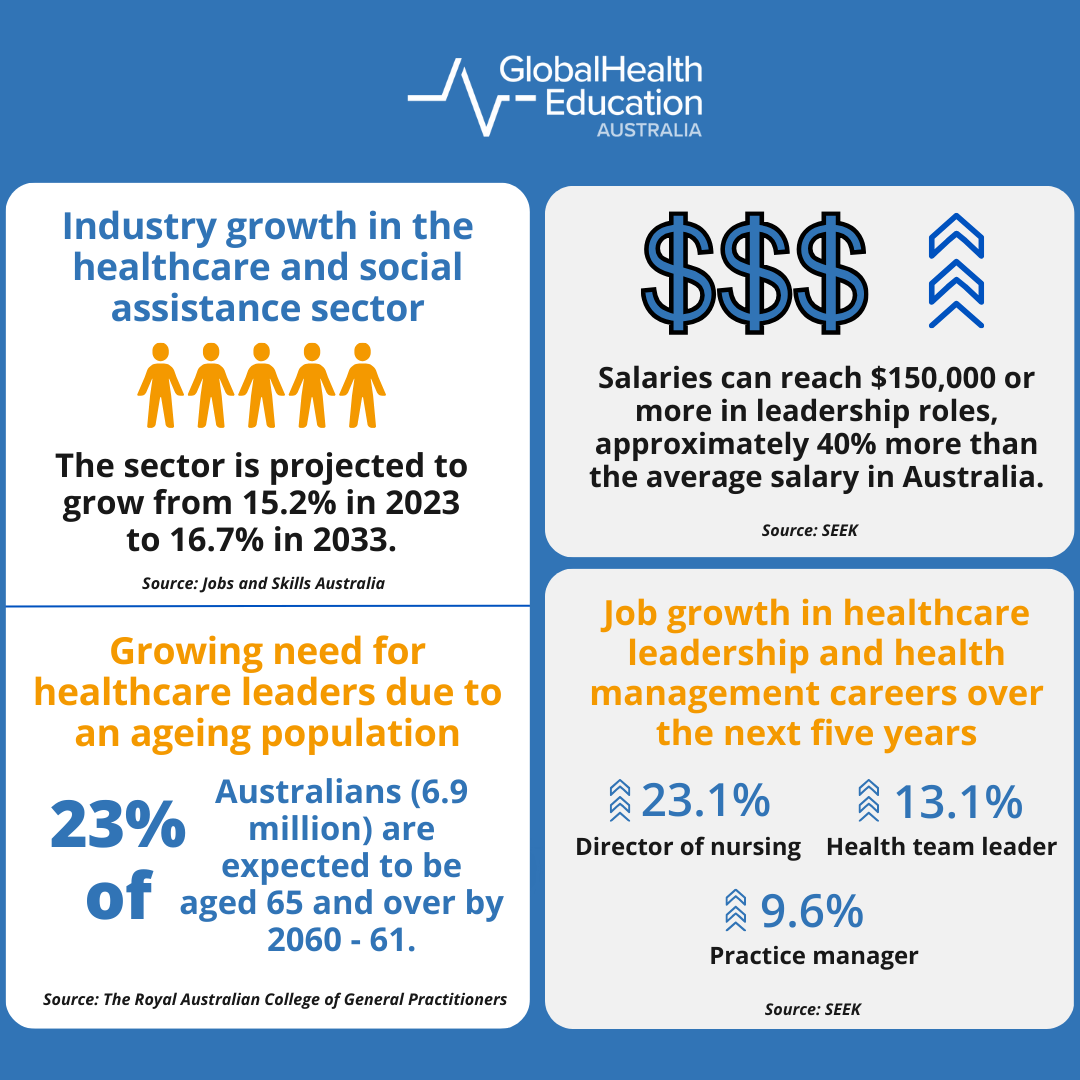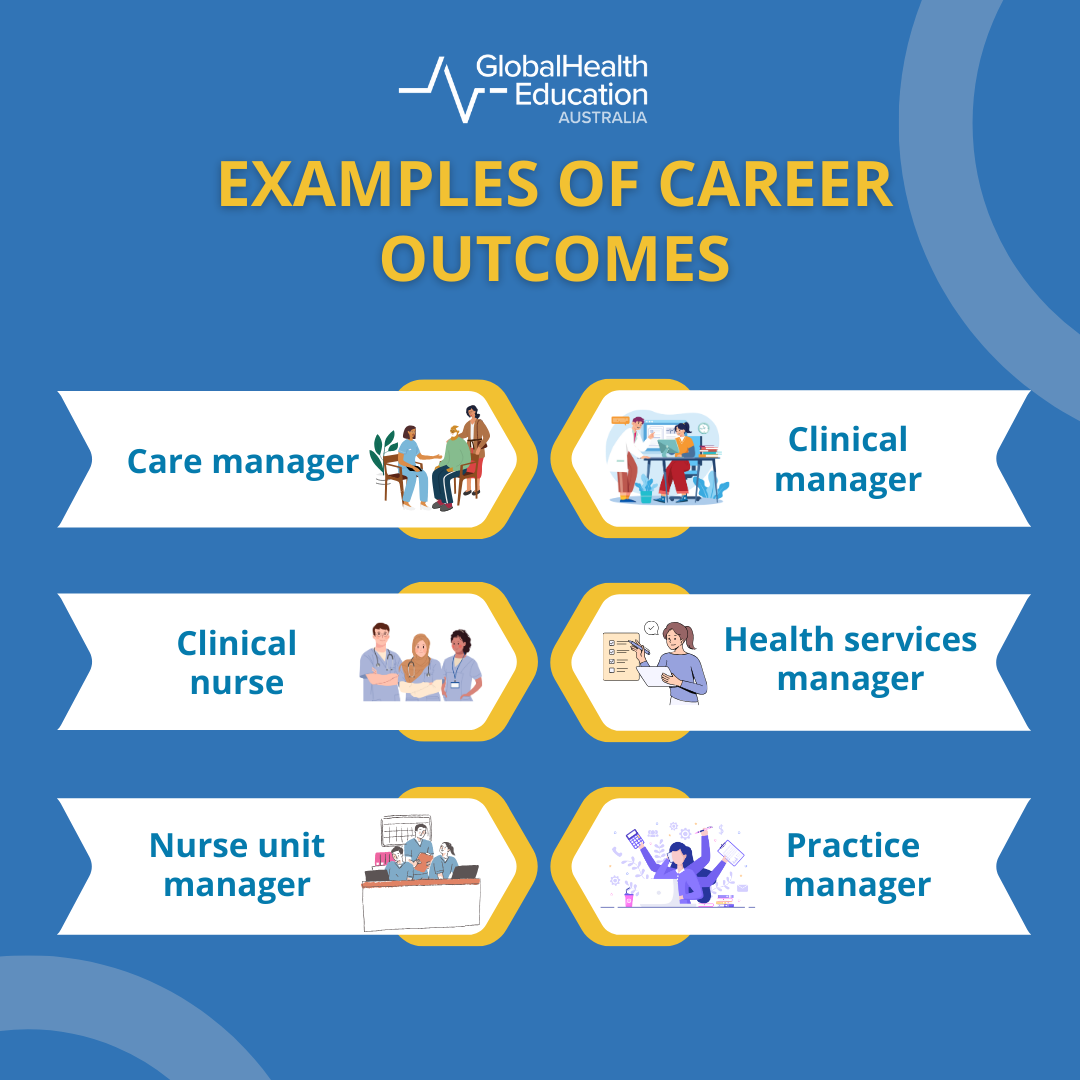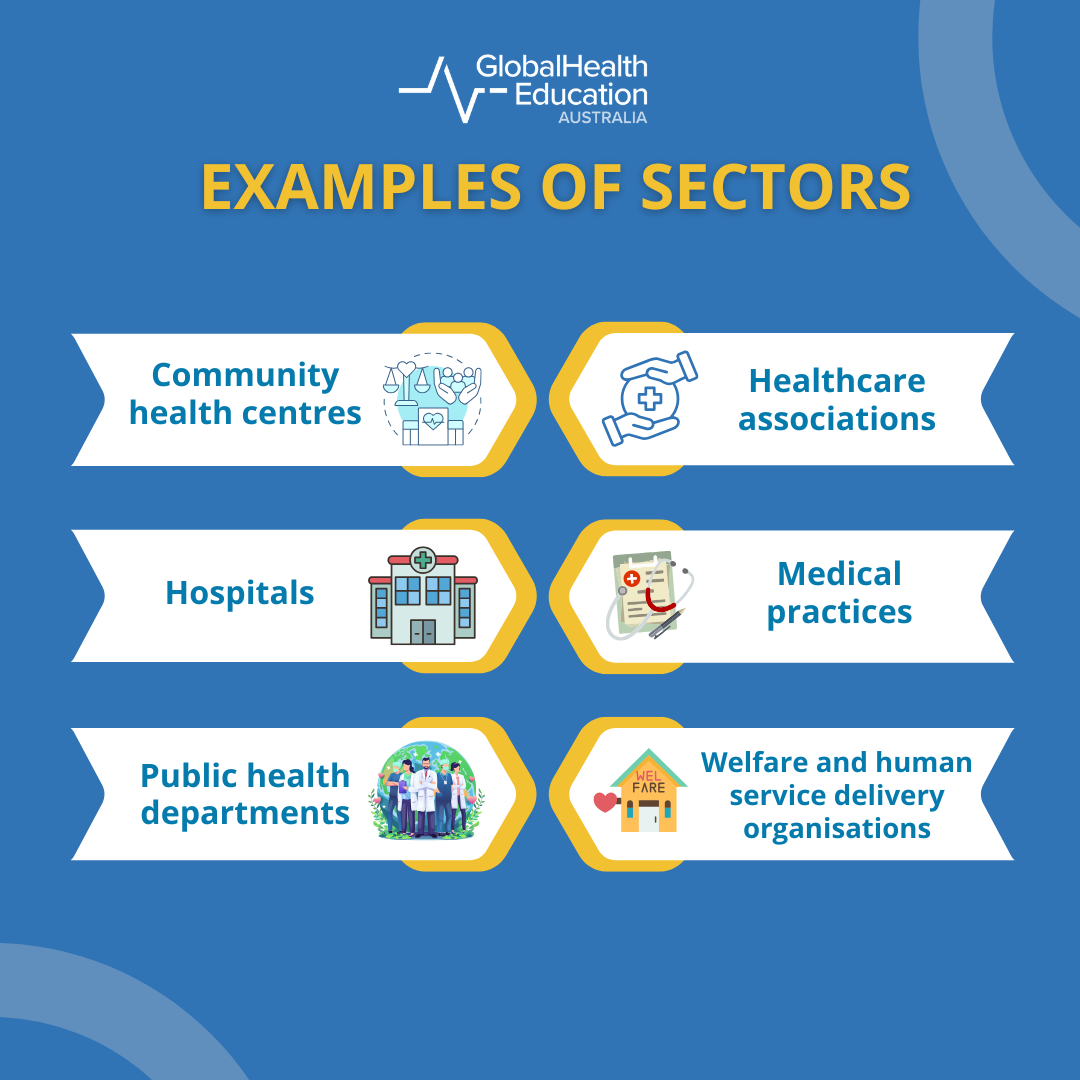In This Guide
- Healthcare leadership and management landscape: industry snapshot
- Why study healthcare leadership or management?
- University rankings for 2025
- Things to consider before studying a postgraduate healthcare leadership or management course
- The difference between a master’s in healthcare leadership or management and an MBA
- Career outcomes
- Salaries
- FAQs
- Prepare to lead and manage in healthcare

Being a leader or manager in healthcare involves having the ability to guide teams, innovate, drive meaningful change and make strategic decisions that improve the quality and efficiency of health services.
A postgraduate qualification in healthcare leadership or health management can equip you with the strategic insights and practical skills to step into senior roles, broaden your career prospects and provide you with the opportunity to network and build professional relationships with your peers, industry professionals and academics.
Healthcare leadership and management landscape: industry snapshot

Why study healthcare leadership or health management?
Advance your career in the healthcare sector
Australia’s healthcare system is continuously evolving, driven by an ageing population, growing demand for health services and workforce shortages across the sector. These pressures have increased the need for skilled leaders who can drive positive change and foster collaboration within teams.
By studying a healthcare leadership or health management course, you’ll develop the skills needed to become an effective leader or manager and step into roles such as director of nursing, health services manager or practice manager.
Gain valuable skills in healthcare leadership or health management
Whether you’re aiming to become a strategic leader or looking to improve healthcare service delivery, studying a healthcare leadership or health management course can help you build the leadership skills needed to manage teams and navigate complex systems. You’ll also develop a deeper understanding of policy, organisational dynamics and the broader Australian health and social care landscape.
For example, the Master of Healthcare Leadership course at Southern Cross University includes subjects like Leading Change in Healthcare and Contemporary Health Leadership, which will enhance your capabilities in areas such as innovation, strategic thinking, teamwork and communication.
Experience an industry-aligned education
Most postgraduate healthcare leadership or health management courses are designed to reflect the realities of today’s healthcare system, ensuring your learning is relevant, up-to-date and applicable in the workplace.
You’ll learn from experienced academics and professionals, many of whom have held leadership roles across healthcare organisations. With content grounded in real-world practice, you’ll graduate with the knowledge to lead across diverse health and social care settings.
In Australia, several courses in health management are also accredited by the Australasian College of Health Service Managers (ACHSM), ensuring the program’s quality and relevance to the industry.
Transition into new career pathways in healthcare
While many students enrol in healthcare leadership or health management courses to progress into leadership roles, these courses are also ideal for those looking to pivot into new areas of the health sector.
Whether you’re seeking a new challenge after years in a clinical setting or hoping to take on a more strategic or advisory-focused role, these courses will provide you with the skills and knowledge to explore alternative career paths. Potential career options may include roles such as health services coordinator, policy and planning manager or clinical coach.
Get a globally recognised qualification
If you’re an international student, studying a postgraduate healthcare leadership or health management course in Australia can provide you with a globally recognised qualification that opens doors to career opportunities both locally and internationally.
While the course content mostly focuses on the Australian healthcare landscape, you will also develop core leadership and management competencies that are relevant and transferable across health systems worldwide.
Many courses also offer flexible online delivery modes, allowing international students to study remotely from their home country while still establishing professional connections and developing the leadership and management skills needed to succeed in a global healthcare environment.
Top Australian universities for postgraduate healthcare leadership and health management courses in 2025
While leadership and health management courses aren’t individually ranked, the closest available measure is the broader subject area of life sciences and medicine. According to the QS World University Rankings 2025, here are the Australian universities that ranked highly in this subject area.
| Rankings | |
|---|---|
| #15 | University of Melbourne |
| #24 | The University of Sydney |
| #34 | Monash University |
| #37 | The University of Queensland |
| #54 | The University of New South Wales |
| #99 | The University of Adelaide |
| #114 | The University of Western Australia |
| #140 | Australian National University |
| #193 | The University of Newcastle |
| #253 | La Trobe University |
| #253 | Queensland University of Technology |
| #261 | Deakin University |
|
#261 |
University of Technology Sydney |
|
#282 |
Curtin University |
|
#289 |
Griffith University |
|
#305 |
Macquarie University |
|
#309 |
Flinders University |
|
#323 |
University of Tasmania |
|
#352 |
University of South Australia |
|
#352 |
University of Wollongong |
| #359 | Western Sydney University |
|
#401 – 450 |
James Cook University |
|
#451 – 500 |
RMIT University |
Things to consider before studying a postgraduate healthcare leadership or health management course
Pursuing a postgraduate healthcare leadership or health management course can be a rewarding step in your professional journey, but like any investment, it’s important to weigh both the benefits and potential challenges before making a decision.
-
- Advantages
-
Broaden your career prospects
Completing a postgraduate course in healthcare leadership or health management can pave the way for diverse career opportunities that involve leading teams, managing services or shaping strategy within the healthcare sector, both in Australia and internationally. -
Industry-relevant skills and knowledge
Pursuing a postgraduate qualification in healthcare leadership or health management equips you with the practical skills needed to address real-world challenges in health and social care settings.
You’ll strengthen your capabilities in areas such as strategic planning, interdisciplinary communication and team leadership, positioning you as a well-rounded leader or manager. -
Fit study around your life
Flexible delivery options such as part-time or online study are available for many postgraduate healthcare leadership and health management courses, making it more manageable to fit study around your professional and personal commitments. -
Expand your professional network
Studying an online healthcare leadership or health management course for example, gives you the chance to connect with like-minded professionals, academics and industry experts through collaborative online discussions, group projects and interactive learning environments.
-
- Challenges
-
Financial investment
Postgraduate study can be a significant financial commitment. Commonwealth supported places (CSPs) are typically limited for healthcare leadership and management courses so consider exploring government loan schemes such as FEE-HELP. -
Time commitment and workload
Postgraduate courses in healthcare leadership or management require a good amount of time and effort.
For example, the Master of Health Services Management course at the University of Technology Sydney takes a minimum of two years to complete part-time. Alongside attending classes, you’ll also need to stay on top of assignments, making effective planning and time management essential for success. -
New concepts and theories
Healthcare leadership and management courses typically focus on areas such as policy, strategy and governance, which can feel quite different from the hands-on, practical learning that those with a clinical background may be more familiar with. It’s a good idea to review the subject units in advance and understand the types of content and learning approaches the course will involve. -
Maintaining focus
Postgraduate study can be demanding and it’s normal to experience periods of low motivation or fatigue. Having a clear sense of purpose, whether it’s career progression or personal development, can help you stay focused and engaged throughout your course.
The difference between a master’s in healthcare leadership or health management and an MBA
If you’re considering postgraduate study, you may be weighing up the differences between a Master of Healthcare Leadership or Master of Health Management and a Master of Business Administration (MBA). While both qualifications can lead to leadership and managerial roles, they differ in areas such as entry requirements and focus.
Here are some of the differences between the two:
| Master of Healthcare Leadership / Master of Health Management | Master of Business Administration |
|---|---|
|
Entry requirements |
Entry requirements |
|
Course content
|
Course content
|
|
Who is it for? This pathway is particularly suited to those looking to step into management, policy or strategic roles within healthcare organisations. |
Who is it for? It’s also well-suited to healthcare professionals looking to transition into a new industry, move into executive roles or start their own private healthcare practice. |
Career outcomes for postgraduate healthcare leadership and health management courses

With a postgraduate qualification in healthcare leadership or health management, you can pursue a wide range of roles across healthcare organisations. From managing teams to overseeing service delivery and operational strategy, below are some career paths to consider:
Care manager
Coordinates services for aged care, disability or community healthcare settings.
Clinical manager
Oversees clinical staff and operational efficiency within healthcare facilities.
Clinical nurse
Senior registered nurses who take on additional responsibilities in clinical leadership, mentoring and care coordination.
Health services manager
Manages operations, budgets, policies and strategic plans in healthcare settings.
Nurse unit manager
Leads and manages nursing teams within hospital units or wards. They are accountable for staffing, clinical standards, budgeting and operational performance.
Practice manager
Oversees the day-to-day operations of private medical practices or clinics. Their responsibilities include managing staff, coordinating patient services, handling finances and ensuring regulatory compliance.
Sectors

These roles span a diverse range of sectors such as:
Community health centres
Support the delivery of multidisciplinary services that address local health needs, often managing programs focused on prevention, early intervention and community outreach.
Healthcare associations
Engage with government agencies, healthcare providers and professional members to advocate for policy improvements, shape standards of practice and contribute to sector-wide health system enhancements.
Hospitals
Work in operational leadership or departmental management, overseeing clinical teams, managing budgets and improving service delivery.
Medical practices
Manage the business and administrative functions of a practice including staffing, patient flow, compliance and operational efficiency.
Public health departments
Involves policy development, program coordination and strategic planning to improve health outcomes at a population-wide level.
Welfare and human service delivery organisations
Oversee the coordination and delivery of integrated health and social care services, managing teams and programs designed to support vulnerable population groups.
Salaries for postgraduate healthcare leadership and health management careers
Below are the average salaries for some of the career outcomes for postgraduate healthcare leadership and health management courses. Salary data has been sourced from SEEK and Talent.com and reflects national averages across Australia. Where available, projected job growth is also included to provide additional insight into employment demand in the sector.
Care manager
Average annual salary: $115,000
Entry-level positions start at $105,000, while experienced workers can make up to $125,000 a year.
Clinical manager
Average annual salary: $120,000
Entry-level positions start at $115,000, while experienced workers can make up to $125,000 a year.
Clinical nurse
Average annual salary: $105,000
Entry-level positions start at $100,000, while experienced workers can make up to $110,000 a year.
Projected job growth: 13.9 per cent over the next five years.
Health services manager
Average annual salary: $127,000
Entry-level positions start at $113,000, while experienced workers can make up to $154,000 a year.
Nurse unit manager
Average annual salary: $128,000
Entry-level positions start at $125,000, while experienced workers can make up to $130,000 a year.
Projected job growth: 23.1 per cent over the next five years.
Practice manager
Average annual salary: $95,000
Entry-level positions start at $85,000 while experienced workers can make up to $105,000 a year.
Projected job growth: 9.6 per cent over the next five years.
Frequently asked questions about postgraduate healthcare leadership and health management courses
How long are healthcare leadership and health management courses?
The duration of study depends on the type of qualification. Below is a general guide:
Graduate certificate
This is the shortest qualification, typically taking around six months full-time or eight months to one year part-time to complete.
Graduate diploma
A mid-level qualification that usually takes one year full-time or approximately 16 months to two years part-time to complete.
Master’s degree
Most master’s courses take around 18 months full-time or two years part-time, however, this can vary depending on the course structure with some courses taking up to three years part-time to complete.
What are the differences between studying healthcare leadership and health management online and on campus?
The main difference between studying online vs on campus lies in the mode of delivery and how you engage with your learning environment. On-campus study offers face-to-face learning, in-person discussions and more opportunities for interaction with peers and academics. In contrast, online study is more flexible and self-paced, though it generally involves less real-time interaction and relies more on digital communication.
Many institutions now offer both online or on campus learning , allowing students to choose the delivery format that best suits their schedule and learning preferences.
Aside from the mode of delivery, the course content and structure are usually very similar, with the same core units, assessment and learning outcomes delivered in both formats. The choice of online vs on campus courses ultimately comes down to your preferred learning style and what suits your lifestyle best.
What are the prerequisites for a postgraduate healthcare leadership or health management course?
While the prerequisites can vary, most postgraduate healthcare leadership or health management courses require a bachelor’s degree in a health-related discipline such as nursing, allied health, public health or social work.
Some courses may also accept a bachelor’s degree in any discipline or relevant work experience (typically three years or more) in the health sector as part of the entry requirements. In other cases, a combination of a bachelor’s degree and at least two years of professional experience in a healthcare setting may be required, particularly at the master’s level.
How much does a healthcare leadership and health management course cost?
The cost of studying a healthcare leadership or health management degree can vary depending on the type of qualification and whether you’re enrolled in a CSP course or are paying the full fee.
Graduate certificate
Costs range from approximately $5,000 for a CSP course like the Graduate Certificate in Health Leadership and Management at the University of New South Wales (UNSW) to around $17,350 for the Graduate Certificate in Health Management at Monash University.
Graduate diploma
Fees range from about $7,000 for a CSP course such as the Graduate Diploma in Health Leadership and Management at UNSW to approximately $29,600 for the Graduate Diploma of Health Management at Deakin University.
Master’s degree
Master’s courses can range from $9,500 for a CSP course like the Master of Health Leadership and Management at UNSW to around $54,684 for a full-fee place such as the Master of Business Administration Specialising in Health at the University of Technology Sydney.
What are the payment options for postgraduate healthcare leadership and management course fees?
There are several ways to help manage the cost of studying a postgraduate healthcare leadership or health management degree.
Commonwealth supported places (CSPs) are government-subsidised places that reduce the overall tuition cost for eligible domestic students. However, CSPs are limited and not commonly available for courses in healthcare leadership or health management, so it’s important to check availability with the institution.
For most students, FEE-HELP would be the option available. This government loan scheme allows eligible students to defer their tuition fees which are repaid through the tax system once a certain income threshold is reached.
You may also be able to access scholarships or postgraduate bursaries. For example, certain universities offer alumni a 10 per cent reduction per unit on enrolment fees for postgraduate award courses.
What skills do graduates gain by studying a postgraduate healthcare leadership or health management course?
The specific skills you gain will depend on the course level and whether the course focuses more on healthcare leadership or health management. While there are subtle differences between the two, most courses aim to equip students with leadership, strategic and operational capabilities relevant to the health and social care sector.
Below is a general guide of the types of skills you can expect to develop:
Graduate certificate
Graduate certificates provide a strong foundation in core leadership and management concepts. Key skills you may gain include:
- Understanding leadership theories and models for healthcare
- Strategic planning and foundational management principles
- Knowledge of governance, accountability and management practices in healthcare settings
Most graduate certificates also offer elective units which allow you to tailor your learning to areas of interest.
Graduate diploma
Graduate diplomas are designed to further your knowledge in the health leadership and health management space. Key skills you may acquire include:
- Advanced understanding of health policy, service planning and systems design
- Research literacy, including interpreting health research and data
- A broader view of how health systems function and are structured at a national or local level
- A deeper understanding of leadership concepts such as facilitative leadership, coaching and organisational culture and management
Similar to graduate certificates, graduate diplomas also typically have electives that you can select based on your interests and goals.
Master’s degree
A master’s course is often the most comprehensive. Some courses also provide an opportunity to specialise, undertake research projects or complete a dissertation. Skills that you may gain include:
- Using healthcare data to inform high-level decision-making
- Implementing and evaluating change in complex health systems
- Developing strategic plans aligned to healthcare goals
- Creating an evidence-based management and leadership plan in the workplace
Master’s courses often offer the widest range of electives, giving you the flexibility to focus on areas most relevant to your career goals.
What specialities are available for postgraduate healthcare leadership and health management courses?
Specialisations are typically offered at the master’s level, most commonly within health management courses. These specialisations allow students to tailor their studies in a particular area of interest or career focus while still building core leadership and management skills.
Some of the specialities available include:
Business administration
Focuses on business strategy, managing change and strategic planning.
Decision-making for health leaders
Enhances understanding in planning, policy, epidemiology and navigating power and politics within healthcare systems.
Digital health analytics
Prepares individuals to lead in digital health and includes units such as Systems and Service Innovation and Fundamentals of Health Information Management.
Disability and inclusion
Centres around inclusive health planning, disability policy and the determinants of health and wellbeing for people with disability.
Health economics
Covers units such as Biostatistics and Economics, Economics for Managers and Health Policy Analysis.
Public health
Covers areas such as epidemiology and biostatistics, alongside studies in contemporary public health issues and policy frameworks.
Quality and safety
Equips individuals with skills in innovation, epidemiology, change management and implementing quality and safety improvement methods.
How hard is a postgraduate healthcare leadership or health management course?
The difficulty of a postgraduate healthcare leadership or health management degree can vary significantly depending on several factors including the level of study, your ability to balance commitments and how easy you find it to understand course concepts.
Level of study
The type of qualification you choose will influence the intensity of the course and time commitment required. For example, graduate certificates are usually shorter and involve fewer units, making it less demanding in terms of workload.
A master’s degree on the other hand is more comprehensive, often involving a higher volume of assignments, projects and in some cases, research components which can make them more challenging.
Balancing study with life and work
The course can be more demanding if you’re working full-time or returning to study after a long break because you’ll need to re-establish study habits, adjust to academic workloads and manage competing priorities.
Understanding course concepts
If you’re coming from a clinical background, you may find the theoretical and strategic nature of leadership and management topics such as health policy, governance and economics more challenging at first as they differ from the hands-on, patient-focused learning typical of clinical roles.
On the other hand, if you’re already familiar with organisational processes or have some experience in administrative or team leadership roles, you may find it easier to grasp these topics.
Prepare to lead and manage in healthcare
Strong leadership and management in healthcare are essential and pursuing a postgraduate healthcare leadership or health management course is a good way to gain the skills required.
At GlobalHealth Education, our university partners offer a wide range of postgraduate healthcare leadership and health management online courses at various levels, from graduate certificates to master’s degrees. Explore our available courses and submit an enquiry to connect with a Student Enrolment Advisor who can guide you through your study options and the application process.
Not sure which course aligns best with your goals? Book a professional development strategy call with our Education Consultant for personalised support and advice.
















